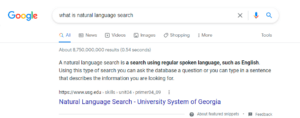Natural language is exactly what you think it is: it is the way we speak naturally. With the help of continuous advancements in their linguistic AI capabilities, advanced search engines have achieved a full understanding of the intent behind the searchers.
Natural Language Processing (NLP) is used to develop this type of search to understand the user’s intent (also called Natural Language Search).
What is natural language search?
Natural language search is when you search using everyday language, phrasing inquiries as if you were speaking to someone. These searches can be typed into a search engine, spoken out using voice search, or asked of a digital assistant like Siri or Cortana as a question.
This contrasts with keyword-based search, which is still the default for most individuals who use web search engines. The goal of a keyword-based search is to break down a query into its most important phrases, eliminating words like “how,” “and,” “the,” and so on.

History of Natural language search
Natural language was widely used in the early days of the internet. In the 1990s, Ask Jeeves was the most popular natural language search engine.
Keyword searches overtook natural language searches as Google became the preferred search engine. Because search engines weren’t sophisticated enough to make the most of natural language at the time, the context and uncertain intent of colloquial terms perplexed them. Keyword-based search aided Google in locating valuable results, although natural language processing was still in progress. On the other hand, modern search engines have only recently begun to catch up.
Evolution of Natural Language Search
Around two years ago, the coming revolution in natural language search began. When Google BERT was announced, it predicted significant changes for the future of SEO and natural language search. BERT is a language model used to pre-train search engines for natural language processing. In 2018, Google introduced it and made it open-source. It enables search engines to comprehend the sensitive context contained in search requests.
Importance of Natural Language Search
The rise of natural language search is part of a broader shift in SEO. As search engines become more sophisticated, Google strives to make its results more useful and understandable. One method is to use natural language search, and another is to use topical authority.
It’s not just Google that’s on the move. Other search engines have been optimized to support natural language search. Bing can now support natural language search effectively.
Increase in Use of Voice Search
One of the reasons that natural language has returned to the search engine family is the rise of voice search. Almost all voice searches, by definition, involve natural language. That is why natural language search is becoming more popular, from basic informational search requests to eCommerce. This opens up a huge new search area for SEO professionals to target.

More Value in Long-tail
These long-tail keywords receive less traffic, but they also have less competition and higher conversion potential. Long-tail keywords generate 4.15 percent more conversions than short-tail keywords. Long-tail keywords will naturally increase as a result of natural language search. And, for SEO professionals, more long-tail keywords mean more potential conversion value.
More Featured Snippets
Another advantage of BERT is that more queries include a featured snippet. Featured snippets are short text selections that Google displays at the top of searches in an attempt to answer a user’s question quickly.

How to Optimize Your Site for Natural Language Search?
Natural language search gives SEO professionals new options, so the logical next step is to optimize your site. However, doing so is more than just adding to your keyword stable. To understand user intent and optimize your posts for quality, you’ll need to take specific steps.
Understanding User Intent
In search, the intent is critical. It’s central to Google’s new ranking strategy. This is true for both topical authority and natural language search.
To understand intent, you must first understand what questions the searcher is attempting to answer. Are they looking to browse? To be educated? To purchase? You must first understand why searchers enter a specific query to understand intent. Knowing the answers to these questions will provide you with a clear understanding of how to create content that meets the needs of your users.
Create informative content
Natural language search is a natural ally of high-quality content. According to industry experts, “Google BERT and NLP require a strong focus on high-quality, informative content.” after determining the questions, your users intend to ask, you must create content corresponding to that intent.
Use your Tech Stack
Semantic search is used in post-BERT natural language search. Thus, now is the best time for SEO to get the most out of natural language search to employ Schema Markup. Schema is a type of semantic vocabulary that helps Google better understand the information on a page. It enables you to tag content on your page based on its item scope. Companies that use Schema will see improved SERP results.
Furthermore, sites that are well-optimized for Schema are more likely to be found through natural language searches.
Wrap Up Note:
As previously stated, search engine optimization is constantly evolving. With the use of natural language search, SEO is focusing more and more on search experience optimization to drive only the best and highest-quality results to those using search engines. Google is a company that excels at these tactics and innovations.
Frequently Asked Questions
What is a natural language search?
A natural language search uses commonly spoken language, such as English. You can use this search to ask the database a question or type in a sentence describing the information you’re looking for.
How does a natural language search engine work?
Natural language search allows users to speak or type into a device instead of keywords. Users can use full sentences in their native language as if speaking to another human, leaving the computer to translate the query into something the computer can understand.
Implement Natural Language Search In your Website
[saswp_tiny_multiple_faq headline-0=”h2″ question-0=”What is a natural language search?” answer-0=”A natural language search uses commonly spoken language, such as English. You can use this search to ask the database a question or type in a sentence describing the information you’re looking for. ” image-0=”” headline-1=”h2″ question-1=”How does a natural language search engine work?” answer-1=”Natural language search allows users to speak or type into a device instead of keywords. Users can use full sentences in their native language as if speaking to another human, leaving the computer to translate the query into something the computer can understand. ” image-1=”” count=”2″ html=”false”]




